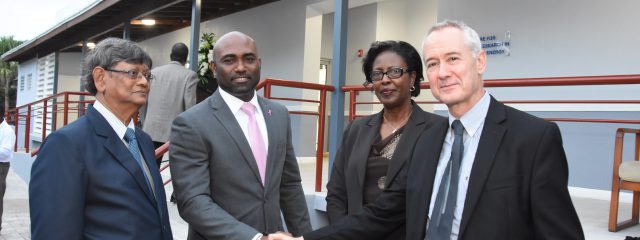From the Jamaica Observer – October 27, 2017
Jamaica and the Caribbean’s first net zero energy building was officially opened on Wednesday on The University of the West Indies’ (UWI) Mona Campus.
The 2,300-square-foot structure, situated along Gibraltar Way, is designed as a model to encourage construction of sustainable and energy-efficient buildings throughout the region.
As a prototype, it will demonstrate emerging and best practices in the built environment as it relates to energy efficiency, renewable energy and environmental design.
The building will house the Centre for Advanced Research in Renewable Energy (CARRE), the first such centre in the Caribbean, promoting research in photovoltaic (solar), wind and biomass energy.
A net zero building is one where the total amount of energy used by the building on an annual basis is roughly equal to the amount of renewable energy created on the site.
The long-term benefits are lower environmental impact and operating and maintenance costs, better resiliency to power outages and natural disasters, and improved energy security.
Minister of Science, Energy and Technology Dr Andrew Wheatley said now that the prototype building is complete and ready for use, Jamaica is looking forward to the results, in order to make the case for more energy-efficient building designs and greater use of renewable resources.
“I welcome this initiative and congratulate all those who have been involved with the project. We want, now, to see more of this happening in both the public and private sectors,” he said.
He noted that the adaptation and implementation of net zero energy buildings will go a far way in reducing the country’s carbon footprint by ensuring future utility cost savings and improved daylighting with less glare.
“The net zero energy building becomes more significant to us when we take account of the fact that buildings account for over a third of the world’s energy use and associated greenhouse gas emissions,” Dr Wheatley pointed out.
It is estimated that more than half of the electricity produced is consumed by buildings, with 10 to 20 per cent of total life-cycle use going into the manufacture and assembly of building material, construction, maintenance, refurbishing and demolition.
Eighty to 90 per cent of energy consumed over the life of the building is for heating, cooling, lighting and ventilation.
Read more: http://www.jamaicaobserver.com/news/net-zero-energy-building-opens-at-uwi_115255
EXPAND was proud to be a part of the management team for the Net Zero Energy Building Project, responsible for information dissemination, communications, and knowledge management.
For more information on the NZEB Project see: https://www.buildbetterja.com/

